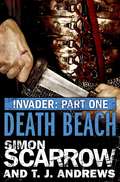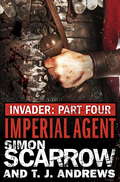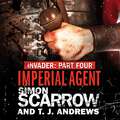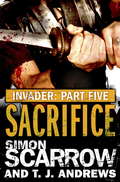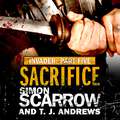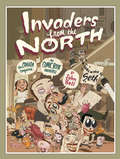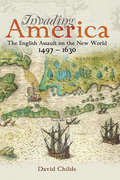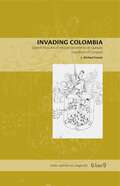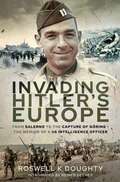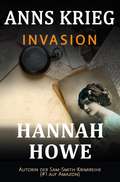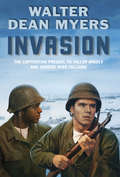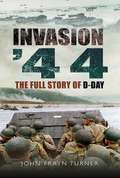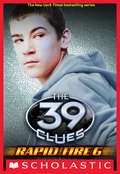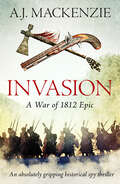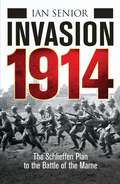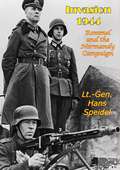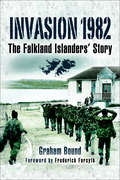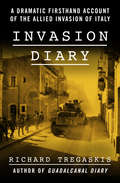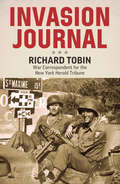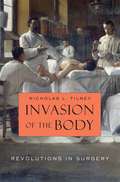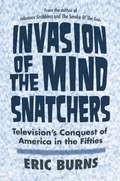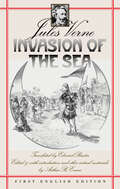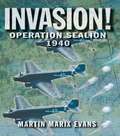- Table View
- List View
Invader: Death Beach (Part One of the Roman Invader Series)
by Simon ScarrowThe first ebook-exclusive novella in the brand new INVADER series, set in Roman Britain, AD 44, from Sunday Times bestselling authors Simon Scarrow and T. J. Andrews The invasion of Britannia has been bloody and relentless, and still the barbaric islanders have not been fully conquered. The men of the Second Legion have suffered grievous losses in driving back their bitterest enemy, but worse is yet to come for the beleaguered soldiers. With winter fast approaching, they face a new threat: ferocious native warriors launching coordinated attacks from their secret base on the Isle of Vectis. In response, the new legate announces a plan to invade Vectis and rout the enemy in what he expects to be a speedy and successful mission. But Horatius Figulus, a junior officer with local knowledge of the enemy, doubts the invasion will be so straightforward. And when the Second Legion encounters fierce resistance on the beach, Figulus and his fellow soldiers suddenly find themselves fighting a desperate battle for their lives....
Invader: Imperial Agent (4 in the Invader Novella Series)
by Simon Scarrow T. J. AndrewsThe fourth novella in the gripping INVADER series, set in Roman Britain, AD 44, from Sunday Times bestselling authors Simon Scarrow and T. J. AndrewsIn the winter of AD 44, Rome's plan to install a friendly king in the most hostile area of Britannia is facing a new threat. There are rumours of a traitor close to the new king, and a new enemy is gathering strength beyond the marshes. As the king continues with his plans to Romanise his subjects, Horatius Figulus, a junior officer in the Second Legion, is charged with training up the new royal bodyguard. But when a trap is sprung on the Roman army, a secretive Druid sect seizes power and takes the king hostage.Now Figulus must infiltrate the enemy ranks, release the king and track down the elusive leader of the Druids - before the whole of Britannia descends into bloody chaos...
Invader: Imperial Agent (4 in the Invader Novella Series)
by Simon Scarrow T. J. AndrewsThe fourth ebook-exclusive novella in the brand new INVADER series, set in Roman Britain, AD 44, from Sunday Times bestselling authors Simon Scarrow and T. J. Andrews In the bitter depths of winter, Rome's plan to install a friendly king in the most hostile area of Britannia is under threat. There are rumours of a conspiracy to unseat the king and Horatius Figulus, the junior officer charged with protecting him, knows the situation is dangerously unstable. But, when the king announces a plan to tax the natives to fund a lavish palace, Figulus is powerless to prevent a violent rebellion. As protests against Roman rule spread, a secretive Druid sect forces out the legion and the king is taken hostage. Now Figulus must infiltrate the enemy ranks, release the king and kill the elusive leader of the Druids before the entire region descends into bloody chaos...
Invader: Imperial Agent (4 in the Invader Novella Series)
by Simon Scarrow T. J. AndrewsThe fourth novella in the gripping INVADER series, set in Roman Britain, AD 44, from Sunday Times bestselling authors Simon Scarrow and T. J. AndrewsIn the winter of AD 44, Rome's plan to install a friendly king in the most hostile area of Britannia is facing a new threat. There are rumours of a traitor close to the new king, and a new enemy is gathering strength beyond the marshes. As the king continues with his plans to Romanise his subjects, Horatius Figulus, a junior officer in the Second Legion, is charged with training up the new royal bodyguard. But when a trap is sprung on the Roman army, a secretive Druid sect seizes power and takes the king hostage.Now Figulus must infiltrate the enemy ranks, release the king and track down the elusive leader of the Druids - before the whole of Britannia descends into bloody chaos...(P)Headline Publishing Group Ltd
Invader: Sacrifice (5 in the Invader Novella Series)
by Simon Scarrow T. J. AndrewsThe gripping final novella in the INVADER series, set in Roman Britain, AD 45, from Sunday Times bestselling authors Simon Scarrow and T. J. Andrews.Britannia, AD 45. Rome's plan to establish a new friendly king over a hostile native tribe is in grave danger. A sinister new Druid sect, led by a charismatic priest, is threatening to destabilise the province and has taken several Roman soldiers prisoner. Now Optio Horatius Figulus faces his most dangerous mission yet. He must venture deep behind enemy lines in search of his captured comrades and the Druids' secret fortress. Can Figulus stop the Dark Moon Druids from inflicting a devastating defeat against the Second Legion? Can he rescue his comrades before they are put to death in a terrifying spectacle?
Invader: Sacrifice (5 in the Invader Novella Series)
by Simon Scarrow T. J. AndrewsThe gripping final novella in the ebook-exclusive INVADER series, set in Roman Britain, AD 45, from Sunday Times bestselling authors Simon Scarrow and T. J. Andrews.Britannia, AD 45. Rome's plan to establish a new friendly king over a hostile native tribe is in grave danger. A sinister new Druid sect, led by a charismatic priest, is threatening to destabilise the province and has taken several Roman soldiers prisoner. Now Optio Horatius Figulus faces his most dangerous mission yet. He must venture deep behind enemy lines in search of his captured comrades and the Druids' secret fortress. Can Figulus stop the Dark Moon Druids from inflicting a devastating defeat against the Second Legion? Can he rescue his comrades before they are put to death in a terrifying spectacle?e to prevail - and save the Second Legion from a devastating defeat.
Invader: Sacrifice (5 in the Invader Novella Series)
by Simon Scarrow T. J. AndrewsThe gripping final novella in the INVADER series, set in Roman Britain, AD 45, from Sunday Times bestselling authors Simon Scarrow and T. J. Andrews.Britannia, AD 45. Rome's plan to establish a new friendly king over a hostile native tribe is in grave danger. A sinister new Druid sect, led by a charismatic priest, is threatening to destabilise the province and has taken several Roman soldiers prisoner. Now Optio Horatius Figulus faces his most dangerous mission yet. He must venture deep behind enemy lines in search of his captured comrades and the Druids' secret fortress. Can Figulus stop the Dark Moon Druids from inflicting a devastating defeat against the Second Legion? Can he rescue his comrades before they are put to death in a terrifying spectacle?(P)2018 Headline Publishing Group Ltd
Invaders from the North: How Canada Conquered the Comic Book Universe
by John BellShort-listed for the 2007 CBA Libris Awards for Book Design of the Year What do Superman, Prince Valiant, Cerebus the Aardvark, and Spawn have in common? Their creators Joe Shuster, Harold Foster, Dave Sim, and Todd McFarlane are Canadians. And while many of the cutting-edge talents of contemporary comix and graphic novels are also from Canada artists such as Chester Brown, Seth, Dave Cooper, and Julie Doucet far too few Canadians realize their country had a remarkable involvement with the "funnies" long before. Invaders from the North profiles past and present comic geniuses, sheds light on unjustly neglected chapters in Canadas pop history, and demonstrates how this nation has vaulted to the forefront of international comic art, successfully challenging the long-established boundaries between high and low culture. Generously illustrated with black-and-white and colour comic covers and panels, Invaders from the North serves up a cheeky, brash cavalcade of flamboyant and outrageous personalities and characters that graphically attest to Canadas verve and invention in the world of visual storytelling.
Invading America: The English Assault on the New World, 1497–1630
by David ChildsA fascinating examination of why England failed for so long to colonize North America, in contrast to Spain’s rapid conquest farther south.Within a generation of Columbus’s first landfall in the Caribbean, Spain ruled an empire in central and south America many times the size of the home country. In stark contrast, after a century of struggle, and numerous disasters, English colonizing efforts farther north had succeeded in settling the banks of one waterway and the littoral of several bays. How and why progress was so slow and laborious is the central theme of this thought-provoking new book. Invading America argues that this is best understood if the development of the English colonies is seen as a protracted amphibious operation, governed by all the factors that traditionally make for success or failure in such endeavors—aspects such as proper reconnaissance, establishing a secure bridgehead, and timely reinforcement. It examines the vessels and the voyages, the unrealistic ambitions of their promoters, the nature of the conflict with the native Indians, and the lack of leadership and cooperation that was so essential for success. Using documentary evidence and vivid firsthand accounts, it describes from a new perspective the often tragic, sometimes heroic, attempts to settle on the American coast and suggests why these so often ended in failure. As this book shows, the emergence of a powerful United States was neither inevitable nor easily achieved.Includes illustrations and a list of historic sites
Invading Colombia: Spanish Accounts of the Gonzalo Jiménez de Quesada Expedition of Conquest (Latin American Originals #1)
by J. Michael FrancisIn early April 1536, Gonzalo Jiménez de Quesada led a military expedition from the coastal city of Santa Marta deep into the interior of what is today modern Colombia. With roughly eight hundred Spaniards and numerous native carriers and black slaves, the Jiménez expedition was larger than the combined forces under Hernando Cortés and Francisco Pizarro. Over the course of the one-year campaign, nearly three-quarters of Jiménez’s men perished, most from illness and hunger. Yet, for the 179 survivors, the expedition proved to be one of the most profitable campaigns of the sixteenth century. Unfortunately, the history of the Spanish conquest of Colombia remains virtually unknown.Through a series of firsthand primary accounts, translated into English for the first time, Invading Colombia reconstructs the compelling tale of the Jiménez expedition, the early stages of the Spanish conquest of Muisca territory, and the foundation of the city of Santa Fé de Bogotá. We follow the expedition from the Canary Islands to Santa Marta, up the Magdalena River, and finally into Colombia’s eastern highlands. These highly engaging accounts not only challenge many current assumptions about the nature of Spanish conquests in the New World, but they also reveal a richly entertaining, yet tragic, tale that rivals the great conquest narratives of Mexico and Peru.
Invading Hitler's Europe: From Salerno to the Capture of Göring—The Memoir of a US Intelligence Officer
by Roswell K. DoughtyA firsthand account of a US Army officer’s part in the liberation of Europe during World War II—from North Africa into the heart of the Third Reich. After graduating from Boston University, Roswell K. Doughty became an Intelligence Officer with the US 36th (Texas) Division. He subsequently saw action in North Africa, then at the disastrous Salerno landings in Italy—where the Allied divisions involved suffered 4,000 casualties—about which the author reveals that suspected intelligence breaches led to the Allies’ plans becoming known to the Germans.Doughty was involved in the grueling battles against the formidable German defenses of the Gustav Line, particularly in the tragic failed attempt to cross the Gari river (Battle of the Rapido River, January 1944) and the struggle to conquer Monte Cassino. After the Anzio landings and the liberation of Rome, Doughty and his infantry regiment, the 141st, took part in the invasion of Southern France in Operation Dragoon, fighting its way up the Rhône River and advancing up to the River Moselle in December 1944. In March 1945, his unit breached the Siegfried Line and crossed into the Germany itself. As an Intelligence Officer, it was also part of Doughty’s duties to interrogate enemy prisoners, which led him to being involved in the capture and detention of Reichsmarschall Go¨ring and in negotiating the surrender of the still-armed and hostile German First Army in May 1945.These are Doughty’s candid recollections from his ground-level point of view. They form a story of survival and a cause for reflection about courage, camaraderie, and the nature of war.
Invasion
by Hannah HoweWährend ihr Ehemann Emrys immer noch vermisst wird, erhält Ann Morgan ein Angebot persönlicher Natur vom charmanten Detective Inspector Max Deveraux. Soll sie dieses Angebot annehmen oder ablehnen? Gleichzeitig steht Ann auch vor einem beruflichen Dilemma. Soll sie nach dem Mord an Trevor Bowman die Zügel seiner Detektivkanzlei in die Hand nehmen? Während Ann über ihr Privat- und Berufsleben grübelt, bittet eine Freundin sie, nach ihrer verschwundenen Tochter zu suchen. Offensichtlich hat diese Tochter, Adeline Hopkins, ein schwieriges Verhältnis zu ihrem Vater. Aber welche Rolle spielen ihr Exfreund und der amerikanische Soldat, mit dem sie kurz ausging? Während sich die GIs darauf vorbereiten, zur zweiten Welle des Vorstoßes gegen die Nazis dazuzustoßen, sucht Ann Antworten, nur um vor ein weiteres Dilemma gestellt zu werden: der Frage, wie der Gerechtigkeit am besten Genüge getan wird.
Invasion
by Walter Dean MyersWalter Dean Myers brilliantly renders the realities of World War II.Josiah Wedgewood and Marcus Perry are on their way to an uncertain future. Their whole lives are ahead of them, yet at the same time, death's whisper is everywhere. One white, one black, these young men have nothing in common and everything in common as they approach an experience that will change them forever. It's May 1944. World War II is ramping up, and so are these young recruits, ready and eager. In small towns and big cities all over the globe, people are filled with fear. When Josiah and Marcus come together in what will be the greatest test of their lives, they learn hard lessons about race, friendship, and what it really means to fight. Set on the front lines of the Normandy invasion, this novel, rendered with heart-in-the-throat precision, is a cinematic masterpiece. Here we see the bold terror of war, and also the nuanced havoc that affects a young person's psyche while living in a barrack, not knowing if today he will end up dead or alive.
Invasion '44: The Full Story of D-Day (Airlife Classics Ser.)
by John Frayn TurnerIn the pre-dawn darkness of 6 June 1944, the greatest armada the world has ever seen began to disembark an Allied invasion force on the beaches of France's Normandy peninsula. Invasion '44 tells the story of that assault from the day over four years earlier, and only a few short weeks after the British disaster at Dunkirk, when a few individuals in the High Command began to turn their thoughts to the possibilities of an eventual return to the mainland, and the story continues up to the time when the Allied beach-head was firmly established on French soil. As the battle progresses, the reader is allowed to view each successive wave as it lands, follow the developing battle line inland, and keep an eye on the vital battles also developing on and beneath the seas off the Normandy peninsula and in the skies above it.
Invasion (The 39 Clues: Rapid Fire #6)
by Clifford RileyThe sixth of seven brand new 39 Clues stories leading up to one explosive reveal. Dan Cahill loves hanging out with his new friend Atticus Rosenbloom a child prodigy whose genius IQ doesn't stop him from playing video games or practicing ninja moves. It's a relief to get to pretend to be a normal kid for once and not worry about finding Clues or looking out for Vespers. But when Atticus's house is attacked by strange intruders Dan has to rely on his Cahill training to keep them out. Are they normal burglars? Or does Atticus's family have a secret of its own?
Invasion (The War of 1812 Epics)
by A.J. MacKenzieA spy and a traitor lead American invaders against a beleaguered Canadian captain in this historical action thriller set during the War of 1812. May 1813. Under covering fire from their navy on Lake Ontario, US troops storm ashore at Niagara. Captain John MacLea and his reformed company of militia fight desperately but they and the other defenders are overwhelmed and forced to retreat. The American force is mightier than it has ever been, spearheaded by Colonel Peter Beauregard, a ruthless spy-master, and James Boydell, a Canadian captain, former friend of MacLea&’s, and traitor to his country. As the invading army closes in, and with no time left, the hope of an entire army, and all its men, rests on the shoulders of the most unexpected of people. Failure is not an option. They must succeed, or face total defeat. Perfect for fans of Adrian Goldsworthy, Bernard Cornwell, and Simon Scarrow.
Invasion 1914
by Ian SeniorFor a century, accounts of the German invasion of France and the opening year of the First World War have been dominated by histories of British troops and their experience in battle, despite the fact that the British Expeditionary Force comprised just four divisions, while the French and Germans fielded 60 each. Published to coincide with the 100th anniversary of the outbreak of the Great War, Invasion 1914 examines how the German invasion of France and Belgium came agonizingly close to defeating the French armies, capturing Paris and ending the First World War before the end of the year. Ian Senior reveals how the initial German strategy revolved around, and in part depended on, rapid victory over the French, and how the failure to achieve this resulted in the surprisingly fluid battles of the early days of the war deteriorating into the trench-based warfare which was to see the war drag on for another four years of unprecedented slaughter. Weaving together strategic analysis, diary entries, eyewitness accounts and interview transcripts from soldiers on the ground with consummate skill, this narrative is a timely investigation into the dramatic early months of the war, as the fate of Europe hung in the balance.
Invasion 1944: Rommel and the Normandy Campaign
by Lt.-Gen. Hans Speidel Col. Truman SmithLieutenant-General Hans Speidel's Invasion 1944 tells the story, from the German viewpoint, of one of the most critical periods of World War II. Indeed, to most Americans the summer months of 1944, highlighted by the battles on the Normandy beaches, represent the climax of the world convulsion. Every detail of this epic struggle is today of interest not only to those Americans who participated personally in the battles on the beaches and in the Normandy countryside, but to that still greater number who sweated and bled in Italy, on South Pacific isles, or in the Philippines, or were forced to stay at home. For the Norman beaches have now become a keystone in the arch of American military tradition--worthy to stand alongside Chancellorsville, Appomattox, Château-Thierry and the Meuse-Argonne. Our curiosity, therefore, cannot but be piqued as to what went on in the Château La Roche Guyon, the headquarters of the German Army Group opposing the Allied Normandy armies, as, day by day, American and British pressure brought Hitler's doom nearer.Invasion is by no means merely military history, a record of the estimates and orders of the German Command during the Normandy struggle. This book tells a double story. The battles are the background, while the foreground is dominated by the narrative of another climactic struggle, that between the commander of the Army Group, Erwin Rommel, "the Desert Fox," and his overlord Adolf Hitler."A notable contribution to the...literature on the Normandy campaign. The author was Chief of Staff successively to Rommel, Kluge and Model.... What he has to say about the German defeat is authoritative and of high interest."--New York Herald Tribune Book Review
Invasion 1982: The Falkland Islanders Story
by Graham BoundThe story of British Falkland Islanders under Argentine occupation—with a new chapter on postwar developments: “Reads like a gripping adventure yarn.” —British Heritage MagazineFalkland Islanders were the first British people to come under enemy occupation since the Channel Islanders during the Second World War. This book tells how islanders’ warnings were ignored in London, how their slim defenses gave way to a massive invasion, and how they survived occupation.While some among the small population established a cautiously pragmatic modus vivendi with the occupiers, some islanders opted for active resistance. Others joined advancing British troops, transporting ammunition and leading men to the battlefields. Islanders’ leaders and “troublemakers” faced internal exile, and whole settlements were imprisoned, becoming virtual hostages. A new chapter about Falklands history since 1982 reveals that while the Falklands have benefited greatly from Britain’s ongoing commitment to them, a cold war continues in the south Atlantic. To the annoyance of the Argentines, the islands have prospered—and an oil bonanza promises further riches.Includes a foreword by Frederick Forsyth
Invasion Diary: A Dramatic Firsthand Account of the Allied Invasion of Italy
by Richard TregaskisA dramatic and richly detailed chronicle of the Allied invasions of Sicily and Italy from one of America&’s greatest war correspondents. Following the defeat of Axis forces in North Africa, Allied military strategists turned their attention to southern Italy. Winston Churchill famously described the region as the &“soft underbelly of Europe,&” and claimed that an invasion would pull German troops from the Eastern Front and help bring a swift end to the war. On July 10, 1943, American and British forces invaded Sicily. Operation Husky brought the island under Allied control and hastened the downfall of Benito Mussolini, but more than one hundred thousand German and Italian troops managed to escape across the Strait of Medina. The &“soft underbelly&” of mainland Italy became, in the words of US Fifth Army commander Lt. Gen. Mark Clark, &“a tough old gut.&” Less than a year after landing with the US Marines on Guadalcanal Island, journalist Richard Tregaskis joined the Allied forces in Sicily and Italy. Invasion Diary documents some of the fiercest fighting of World War II, from bombing runs over Rome to the defense of the Salerno beachhead against heavy artillery fire to the fall of Naples. In compelling and evocative prose, Tregaskis depicts the terror and excitement of life on the front lines and recounts his own harrowing brush with death when a chunk of German shrapnel pierced his helmet and shattered his skull. An invaluable eyewitness account of two of the most crucial campaigns of the Second World War and a stirring tribute to the soldiers, pilots, surgeons, nurses, and ambulance drivers whose skill and courage carried the Allies to victory, Invasion Diary is a classic of war reportage and &“required reading for all who want to know how armies fight&” (Library Journal). This ebook features an illustrated biography of Richard Tregaskis including rare images from the American Heritage Center at the University of Wyoming.
Invasion Journal
by Richard L. TobinInvasion Journal, first published in 1944, is veteran war correspondent Richard Tobin's account of his time in England, aboard several Royal Navy fighting ships, and in France with American G.I.s shortly after the D-Day invasion. Offering interesting insights into English life – the food, morale of the civilians, V-1 bombings – as well as a look at Allied soldiers from its leaders to its soldiers and sailors, Invasion Journal portrays war-time life as it was for millions of people during the heady year of 1944. Of note is his coverage of the broadcasts by the Nazis of the unsuccessful attempt on Hitler's life on July 20, 1944. Tobin (1910-1995) was a reporter, editor, and war correspondent for The New York Herald Tribune from 1932-1956. From 1960-1976 he worked at The Saturday Review as a senior editor and executive.
Invasion of the Body: Revolutions in Surgery
by Nicholas L. TilneyIn 1913, the Peter Bent Brigham Hospital in Boston admitted its first patient, Mary Agnes Turner, who suffered from varicose veins in her legs. The surgical treatment she received, under ether anesthesia, was the most advanced available at the time. At the same hospital fifty years later, Nicholas Tilney—then a second-year resident—assisted in the repair of a large aortic aneurysm. The cutting-edge diagnostic tools he used to evaluate the patient’s condition would soon be eclipsed by yet more sophisticated apparatus, including minimally invasive approaches and state-of-the-art imaging technology, which Tilney would draw on in pioneering organ transplant surgery and becoming one of its most distinguished practitioners. In Invasion of the Body, Tilney tells the story of modern surgery and the revolutions that have transformed the field: anesthesia, prevention of infection, professional standards of competency, pharmaceutical advances, and the present turmoil in medical education and health care reform. Tilney uses as his stage the famous Boston teaching hospital where he completed his residency and went on to practice (now called Brigham and Women's). His cast of characters includes clinicians, support staff, trainees, patients, families, and various applied scientists who push the revolutions forward. While lauding the innovations that have brought surgeons' capabilities to heights undreamed of even a few decades ago, Tilney also previews a challenging future, as new capacities to prolong life and restore health run headlong into unsustainable costs. The authoritative voice he brings to the ancient tradition of surgical invasion will be welcomed by patients, practitioners, and policymakers alike.
Invasion of the Mind Snatchers: Television's Conquest of America in the Fifties
by Eric BurnsWhen the first television was demonstrated in 1927, a headline in The New York Timesread, “Like a Photo Come to Life. ” It was a momentous occasion. But the power of television wasn’t fully harnessed until the 1950s, when the medium was, as Eric Burns says, “At its most preoccupying, its most life-altering. ” And Burns, a former NBC News correspondent who is an Emmy-winner for his broadcast writing,knows about the impact of television. Invasion of the Mind Snatcherschronicles the influence of television that was watched daily by the baby boomer generation. As kids became spellbound by Howdy Doodyand The Ed Sullivan Show,Burns reveals, they often acted out their favorite programs. Likewise, they purchased the merchandise being promoted by performers, and became fascinated by the personalities they saw on screen, often emulating their behavior. It was the first generation raised by TV and Burns looks at both the promise of broadcasting as espoused by the inventors, and how that promise was both redefined and lost by the corporations who helped to spread the technology. Yet Burns also contextualizes the social, cultural, and political events that helped shape the Fifties-from Sputnik and the Rosenberg trial to Senator Joseph McCarthy’s Red Scare. In doing so, he charts the effect of television on politics, religion, race, and sex, and how the medium provided a persuasive message to the young, impressionable viewers.
Invasion of the Sea (Early Classics of Science Fiction)
by Jules VerneFirst English edition of a classic Verne novel. Jules Verne, celebrated French author of Twenty Thousand Leagues Under the Sea and Around the World in 80 Days, wrote over 60 novels collected in the popular series "Voyages Extraordinaires." A handful of these have never been translated into English, including Invasion of the Sea, written in 1904 when large-scale canal digging was very much a part of the political, economic, and military strategy of the world's imperial powers. Instead of linking two seas, as existing canals (the Suez and the Panama) did, Verne proposed a canal that would create a sea in the heart of the Sahara Desert. The story raises a host of concerns — environmental, cultural, and political. The proposed sea threatens the nomadic way of life of those Islamic tribes living on the site, and they declare war. The ensuing struggle is finally resolved only by a cataclysmic natural event. This Wesleyan edition features notes, appendices and an introduction by Verne scholar Arthur B. Evans, as well as reproductions of the illustrations from the original French edition.
Invasion!: Operation Sea Lion, 1940
by Martin Marix Evans Angus McgeochThis terrifying alternative reality is actually based on historical facts. The book follows the real course of events up to1 September, including the planning in Britain and Germany, and the aerial war. The fictional story then supposes that the Germans halted their advance in France along the Seine and the Aisne after the fall of Paris and that Marshal Petain conceded an armistice at that point. The Panzer divisions are thus able to rest and re-equip in northern France…A brilliant blend of meticulous research and imagination, this book is bound to appeal to anyone with an interest in the causes and effects of historical events, and indeed to anyone interested in world war history itself.
